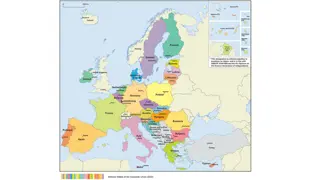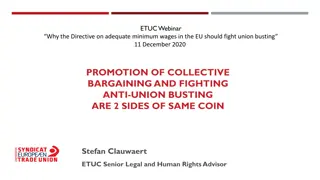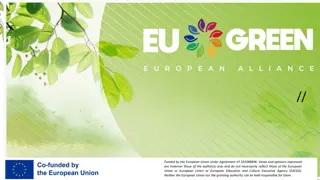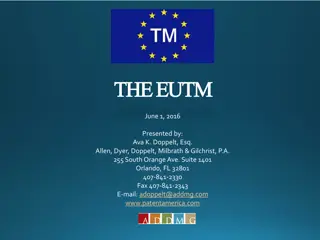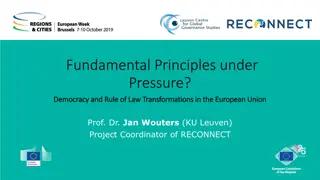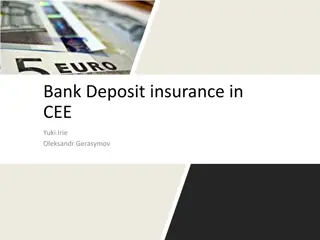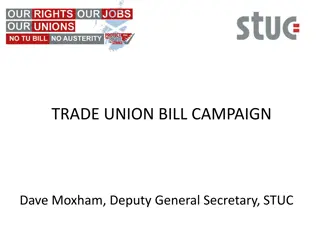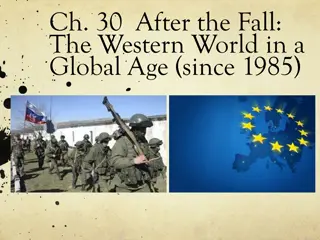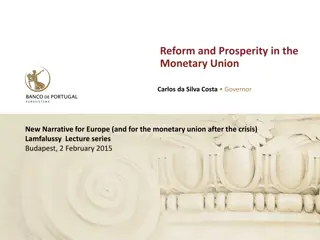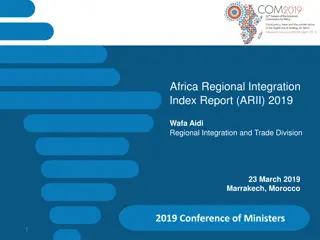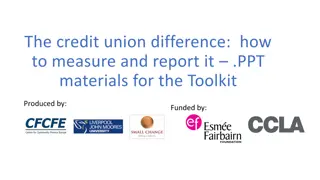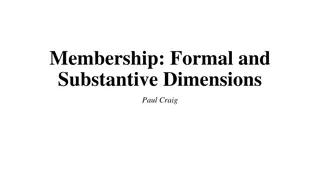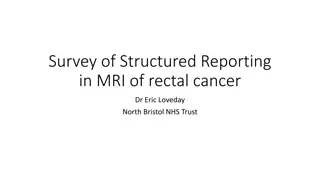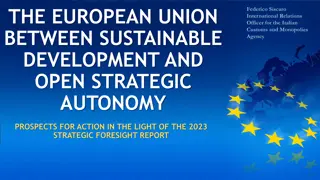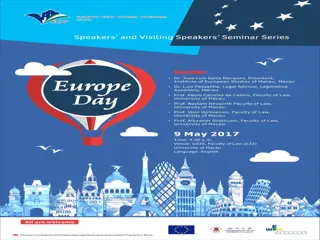Understanding European Union: Reporting and Integration Insights
The European Union plays a pivotal role in the politics and economies of its 28 member states. Citizens are increasingly engaged with EU institutions like the Commission and the Parliament. This content delves into how the EU is perceived, reported, and communicated, as well as the challenges faced in EU journalism and the integration process. Explore the historical context of European political integration and economic ties within the EU as you uncover future challenges in EU reporting.
Download Presentation

Please find below an Image/Link to download the presentation.
The content on the website is provided AS IS for your information and personal use only. It may not be sold, licensed, or shared on other websites without obtaining consent from the author. Download presentation by click this link. If you encounter any issues during the download, it is possible that the publisher has removed the file from their server.
E N D
Presentation Transcript
REPORTING & WRITING ABOUT THE EUROPEAN UNION
EU INTEGRATION, POLITICS TRANSFORMATION & JOURNALISM RESPONSE European Journalism, AUTH Ioanna M. Kostopoulou Vagia-Danai Panopoulou November, 2018
OUTLINE 1. The European Union How is the EU understood,reported & communicated 2. EU Journalism An overview on the difficulties,problems & practices 3. European integration Towards a European public sphere 4. Summary Future challenges of EU reporting
1. The European Union How is the EU understood,reported & communicated 2. EU Journalism An overview on the difficulties,problems & practices 3. European integration Towards a European public sphere 4. Summary Future challenges of EU reporting
EUROPEAN UNION EU occupies a central position in the politics & economic life of its 28 members & the world The legitimacy of the EU s action was/is trenchant & the EU pubic has never been so opinionated about the EU project as it is now Citizens understand what effect the EU Commission, the Parliament & the council of Ministers have on their lives The relationship between the EU, transnational democracy & professional Journalism
EUROPEAN POLITICAL INTEGRATION Many countries joined the EU since 1958 1958 Belgium, France, Germany, Italy, Luxembourg, Netherlands 1973 Denmark, Ireland, United Kingdom 1981 Greece 1986 Portugal, Spain 1995 Austria, Finland, Sweden 2004 Cyprus, Czech Republic, Estonia, Hungary, Latvia, Lithuania, Malta, Poland, Slovakia, Slovenia 2007 Bulgaria, Romania 2013 Croatia The connection between democracy and nation-states was not necessary but historically contingent J rgen Habermas Nation states still carry much of their political, economic and cultural weight
EUROPEAN ECONOMIC INTEGRATION 19 member states joined the Eurozone Belgium, France, Germany, Italy, Luxembourg, Netherlands , Ireland, Greece, Portugal, Spain, Austria, Finland, Cyprus, Estonia, Latvia, Lithuania, Malta, Slovakia, Slovenia and had to deal with the consequences of the Euro crisis Source: Bankrate
1. The European Union How is the EU understood, reported & communicated 2. EU Journalism An overview on the difficulties, problems & practices 3. European integration Towards a European public sphere 4. Summary Future challenges of EU reporting
EU Definition of EU journalists: JOURNALISTS: WHO ARE THEY? Editors & reporters writing the news & taking decisions that influence EU information gathering & selection processes for European governance Their working environment Commercial & institutional constraints organizational culture & editorial line acts of strategic political communication to gain influence
What they need a knowledge-base for European politics accurate material which is usable news copy linkages to European political institutions access to official documents/experts/quotable figures/politicians Barriers to effective coverage Difficulty in finding adequate newsworthiness within European politics Resources committed to support European influence a journalist s information gathering possibilities
SOURCE STRATEGIES: Political actors vs. EU institutions Source strategies =mobilization & agenda-setting activities, targeted at journalists Political actors have vested interests in cases of unpopular legislation EU institutions as political actors more EU than normal correspondents target communications at topical specialists compete with national political actors for the attention of EU correspondents EU communication is considered worse than national governments Hierarchy in shaping information available to journalists National > regional > European actors > supra-international
EU Routines & practices of Journalism to local political cultures & systems JOURNALISM I Different forms of professionalism & Journalism EU: a common problem for a continent of journalists Media s responsibility for the EU s democratic deficit , visibility & communication deficit . Until the economic crisis: national media covered the EU very little During the crisis: lack of understanding of the issues, the mechanisms, lack of sufficient staff
EU JOURNALISM II Vast amount published about & by the EU: announcements, briefings, interviews Think tanks in Brussels pour out analyses & advice Journals & websites: up-to-the minute , distant from their subject to be critical Public: sporadically interested in politics & public institutions Times of crisis & important decisions: the attention reaches a peak Good times: news from Brussels is first to disappear from newspapers & TV News media have the responsibility of covering the EU
NEWS All news is local News from nowhere Transnational media See their mission, their business model Coverage with little or no national focus Reuters, Bloomberg, AP, AFP The Economist, The Wall Street Journal BBC, CNN Journalists bring their nation with them Brussels journalists: miss what these institutions do How far they are useful to the national interest: losers, winners, opponents, allies Europe an adjunct to the nation, speaks to itself , a chamber where each nation can blame
WHAT SHAPES MEDIA COVERAGE? I European journalism and its relationship to politics 1. Factors external to news production (the supply of information produced by political actors agenda-setting activities + EU s quality of information provision) 2. Factors internal to news production (journalists reporting practices + their own agenda-setting targets & campaigns) 3. Journalistic views on media performance External factors: amount and type of information that political actors target at journalists, journalists perceptions of the information quality supplier by EU institutions
WHAT SHAPES MEDIA COVERAGE? II Internal factors: journalists experiences on news reporting, who do they attempt to influence through opinion-leading in commentaries and by campaigns Short- VS long-term consequences of major events Political and economic events shape short-term; dominant views shape long- term Different aspects of political communication Infrastructure, readership s commentating, political role, advocacy demand, source strategies, reporting, Journalists perceptions on the frequency of political actors source strategies
DOES IT HAVE TO BE BORING & COMPLICATED? EU Journalism is in a various circle, is boring & difficult Reporters & editors do not report from Brussels People do not want to read news from Brussels Talking seriously about EU politics does not win votes How can the general public think the importance of EU? Starting from zero What about some basic knowledge? Little public awareness about everyday EU matters European citizens know much more about the political life in White House than Brussels
THE GAP IN UNDERSTANDING Technical & complex decision-making pace Not well versed in economics & finance How to translate something complicated into simple words The focus of the reporting changed: from Brussels to other cities in Europe Widened gulf between journalists and the EU Genuine interest about: new taxes, austerity measures, welfare cuts Viewers & readers: demanding & skeptical
THE EU HAS DECIDED An EU report says , according to an EU proposal without explaining what the mysterious EU is The EU is not part of normal politics EU political process: distant, cold, strange Insecurity about how the EU functions European Commission: the only EU institution that has the right to propose new laws Council of ministers: is composed of the ministers from the 28 member states governments European Parliament: directly elected by the European citizens every 5th year The council & the parliament amend the commission proposal & adopt the law.
1. The European Union How is the EU understood, reported & communicated 2. EU Journalism An overview on the difficulties, problems & practices 3. European integration Towards a European public sphere 4. Summary Future challenges of EU reporting
COUNTRIES STILL MATTER What about a truly European public sphere? The most dramatic crisis that the Eurozone has passed through since its creation is threated mostly through national interests & needs Habermas concept of the EPS: pure public interest, free from private or nationalist interests Europe & its crisis: far from the interests of the man in the street Two different Europes: the Europe of the market and the Europe of citizens
DID POLITICS TRANSFORM? Different degrees of integration of member states into EU processes Democratic & communication deficit Politicians blame the media for the EU s democratic deficit and its lack of visibility, resonance and legitimacy; EU elites see better communication through national media as the best way to improve their legitimacy Adequate political communications are essential to ensure effective links between political institutions and citizens Multi-levelling and trans-nationalization of governance
EUROPEAN PUBLIC SPHERE I 1990s pressure: more open & democratic union European public sphere : cure for the European union s democracy deficit European democracy & integration deficit: resolution through the formation of a pan-European political public sphere (Habermas) The idea of a common European public sphere is inconceivable Realistic goal: to pursue the Europeanisation of various national public spheres Integration- positive elites VS more critical led to the emergence of populist movements Pan-european public sphere or national than pan- european interests?
EUROPEAN PUBLIC SPHERE II Participation, legitimacy, globalization, question of identities The EU as we have it today will NOT produce a European public sphere about matters concerning EU member states Press performance as an indicator of how national political contexts and different media formats constrain the role of the press in contributing to a Europeanization of national public spheres When journalism inadequate for the purposes of politicians, it has ceased to exist. The emergence of a European sphere of publics requires the dissemination of a European news agenda that becomes part of the everyday news-consuming habits of European audiences, to an extent that publics come to understand citizenship and belonging as at least in part transcending the nation-state. Resistance stops being Philip Schlesinger
THE PIONEERS & THE CRISIS Pioneers of a new kind of reporting in the first EU decades Brussels: crossroads where different journalistic cultures met & worked Jean Monnet, Paul Henri Spaak, Altiero Spinelli 1980s new generations of journalists, distant attitude EU: legitimate source of political & economic power 2000s next generations of journalists, critical approach, public disillusionment with the EU 2008 aggressive, euro currency, crisis Public relations officials as overprotected of their masters
WHAT IS THE CRISIS ABOUT? Euro crisis: challenge to European integration in 60 years Testing the structures & powers of the EU, Eurozone Group of interrelated economic crises European news coverage: central role in shaping public perceptions, implications for identity & integration Coverage: limited, elite oriented, national frames Euro crisis coverage: personalized around political leaders The missing European citizen
The EU faces many forms of professional journalism and challenges the existing forms of political journalism Political contexts such as the EU demand new kinds of journalism Journalists highlight limitations provision due to: the EU s technocratic style, the complexity due to the number of countries and issues involved, the remoteness of EU institutions and their press offices Correspondents from new member states are seen as agents of Europeanization Limited sense of emerging Europeanization among journalists National news coverage is embedded in specific national and cultural contexts: at times of crisis, conflict, or unique events, national news coverage often differs across countries (e.g. Euro crisis) JOURNALISM RESPONSE TO EU INTEGRATION in information-
THE National politicians: pass the buck on unpopular decisions INFORMATION JUNGLE The EU institutions: unhelpful in making the EU understandable, poor at communication The highlights or news from the early 2000s Too many cooks in the communication kitchen Every country wants to make a cultural & linguistic mark in the union Who speaks on behalf of the EU? The The commission parliament The world is like this: The member states
WHO CARES? The coverage of the EU is difficult for Journalism The Union & its institutions devoid of the dramas Unknown officials to most Europeans Slow, complex & hard to grasp processes Commoner: Just think. Which one of those stories do you believe? Popular media could convey the central EU issues Woodcutter: None make any sense. Polemical & brief coverage The crisis forced cuts on the news media EU information depended on freelancers & fixers (Rashomon, Akira Kurosawa, 1950) Less expensive workforce, the correspondents replaced
TRANSNATIONAL JOURNALISM & THE EU I Journalism s re-contextualization A broader frame of reference provided by theories of transnational democracies and public spheres is needed One of the preconditions for a European public sphere Transnational newspapers in English targeted at elite or business readerships (e.g. Financial Times Europe, International Herald Tribune Europe, Wall Street Journal Europe, European Voice)
TRANSNATIONAL JOURNALISM & THE EU II Journalists receive significantly more information mobilized from EU institutions, political parties, interest groups and campaign & protest groups, than from national and regional actors Limited but emergent Europeanization of journalism carried by transnational newspapers serving specialist audiences and to a limited extent by European correspondents on the national press Increasing similarities in the transnational news coverage of the EU during routine periods Rather small potential of transnational media to diminish the alleged democratic deficit
1. The European Union How is the EU understood, reported & communicated 2. EU Journalism An overview on the difficulties, problems & practices 3. European integration Towards a European public sphere 4. Summary Future challenges of EU reporting
MORE OR LESS EUROPE A series of changes in EU sixty year history Economic crisis: encouraged politicians & officials for more Europe Fiscal coordination at the center of the Eurozone Centrifugal pressures Popularity of the anti- EU parties Far right & far left parties: Less Europe , no EU at all EP real drama & debate: the right for the EU to exist Media struggling to engage their public with the EU A large step forward: Journalism which wants to interest the public
EUROPEAN JOURNALISM OR MANY JOURNALISMS? Eurozone countries with financial problems Non- Eurozone countries Other Eurozone countries
TAKE-AWAYS I EU integration journalism is important For Democracy to function: we need to understand how, when and why political decisions are taken, to debate political alternatives, to hold representatives Media is a link between political power and the citizen Correspondents & freelance journalists Brussels- based reporters cover the big stories. No time to cover the many steps of the EU legislative process Give EU questions the attention they deserve Generalist and specialist reporters start incorporating the EU into everyday reporting
TAKE-AWAYS II The EU is a problem for journalism, and journalism is a problem for the EU Future challenges: new member states, creation of new nations Journalists would be able to Europeanize more if politicians improved their own communication efforts and made European governance more relevant to citizens Creation of a European public sphere through transnational media
THANK YOU! Ioanna & Valia
PLUS: SOURCES Lloyd, J. & C. Marconi (2014), Reporting the EU: News Media and the European Institutions Sigrid Melchior (2017), A Reporter s Guide to the EU R. G. Pickard (2015), The Euro Crisis and the Media: Journalistic Coverage of Economic Crisis and European Institutions P. Statham (2008), Making Europe news: How journalists view their role in media performance R. Kunelious (2008), Journalism and the EU: A relationship in contexts



